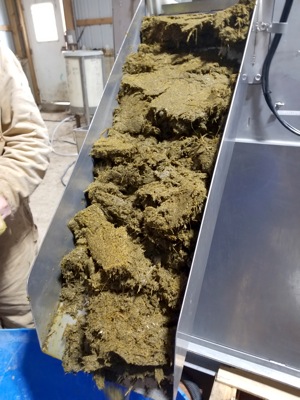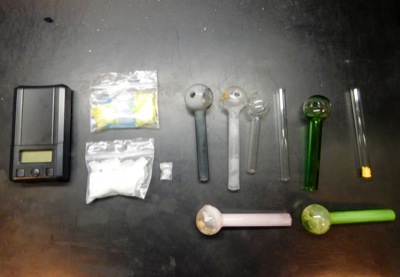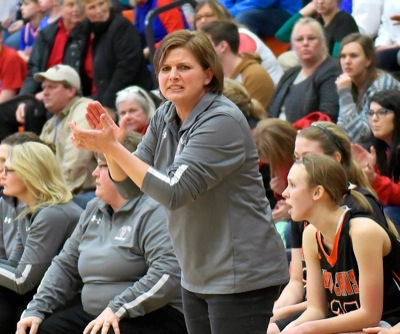Thursday, March 8th, 2018
Local farm hosts pilot test
Designed to remove nutrients
By William Kincaid

Submitted Photo
Dairy manure solids come off a separator as part of a pilot test underway at a farm in the Grand Lake Watershed this week.
GRAND LAKE - Several officials this week are conducting a pilot test at a farm in the Grand Lake watershed to evaluate the efficacy of a two-part nutrient removal system on both dairy and swine manure.
The project is testing about 2,000 gallons of manure a day at the undisclosed farm.
"Obviously this could be scaled up and the whole purpose of this pilot is to see how effective it is in removing nutrients and what the cost is to operate it," Ag Solutions Coordinator Theresa Dirksen told Mercer County commissioners.
Nutrient runoff comes from many sources, but in the Grand Lake Watershed, studies show it's mostly from farmland in the 58,000-acre, livestock-heavy area. Phosphorus found in manure is the algae's favorite food source.
Couinty commissioners agreed to pitch in up to $5,000 in conveyance fees for the pilot test while other entities also are contributing to the study. The county receives a real estate conveyance fee of $1 per $1,000 of property sold to support its community development office and strengthen the local workforce.
"Our ultimate goal is to do this without any chemicals because that takes your operating cost down so low so all you're paying for is electricity to run it," she said.
Key stakeholders in the pilot test are Martin Witmer of KDS Separation, Chris Putt of Chemtron and Rick Johnson of InNow, Water & Environmental Services, who have a "significant stake in it," she said.
"They're sharing in on the cost, quite a bit actually. They're paying for all their folks to come out here and operate it," she said. "They have a grant through OWDA (Ohio Water Development Authority) where they're using some of those funds for this as well."
The first part of the test involves using the KDS Multi-Disc Roller Separator to separate both swine and dairy manure.
"This technology has an installed base over 500 installations in Asia (primarily Japan), with considerable experience in dewatering of both swine and dairy manure," Dirksen wrote in her proposal.
Swine manure will be taken from a deep-pit manure management system and dairy manure from a lagoon, Dirksen noted.
"KDS will provide a dewatering pilot unit capable of operating at 4 gallons per minute in a continuous mode, and representatives from both KDS and Chemtron will be onsite to assist in optimizing the overall operation," Dirksen wrote.
Dewatered manure filtrate then will go through a second process using water treatment technology provided by Kathar's Scientific LLC.
"So we're taking that tea-colored water that comes off the separator and putting that through the (second) unit, which is just getting out more of your solids, and it floats those solids to the top and then you basically scrape them off," Dirksen explained.
The second unit uses ion-injecting generators and magnets, she said.
"So we're introducing air into the water source and then that floats our solids to the top," she noted. "(Johnson's) ionizing the air and magnetizing the air and it uses no chemicals."
The pilot test will be conducted throughout the month.
Key stakeholders are contributing to the project as well as the Lake Improvement Association and the Dairy Producers Association, Dirksen pointed out.
Every year since 2009, the state has issued advisories for the 13,500-acre recreational lake due to unsafe levels of microcystin algal toxins. The toxins can harm the liver and cause gastrointestinal symptoms and rashes. Since then, toxin-producing algae have become a worldwide issue.
On Jan. 18, 2011, the state designated the local watershed distressed after humans and animals in 2010 were sickened by blue-green algae in the lake. This triggered new rules for watershed farmers, including mandatory nutrient management plans involving soil tests and restricting manure application.
Prior to the designation, different local groups had already formed to research algae-reduction technology in the lake. In late 2011 the farmer-led Ag Solutions group formed to research ways to help local farmers manage their manure. The group was facilitated by unpaid volunteer Jim Keller and held meetings. He pressed county commissioners to come up with funding to hire a full-time employee to work on the issue, and Dirksen was hired in March 2016.


